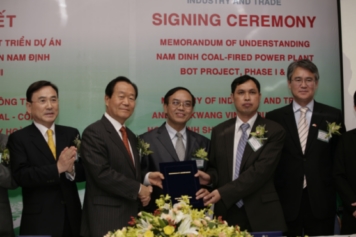 |
31-Mar-2010
South Korean conglomerate Taekwang Group will put spurs to a $4.5 billion (5.2 trillion won) coal-fired power plant project in Vietnam’s northern province of Nam Dinh.
A consortium led by Taekwang Vina Industrial Co. signed a memorandum of understanding (MOU) on construction of the power plant in Nam Dinh with the Ministry of Industry and Trade of Vietnam at the Melia Hotel in Hanoi on March 30.
Under the MOU, Taekwang Vina will pour $4.5 billion into Nam Dinh Province to construct four 600 MW power plants by 2021. With a final capacity of 2400 MW, this marks the largest power plant project undertaken by a South Korean company in Vietnam.
According to the company, Taekwang Vina will be provided with 8.8 million tons of Vietnamese anthracite coal per year and will offer an annual supply of 17 billion kW of electricity. Starting from 2016 when the first power plant begins operation, Taekwang Vina would sell electricity to the Vietnamese government for twenty-five years under a Build-Operate-Transfer (BOT) strategy.
BOT is a form of private investment, wherein a constructor for major infrastructures, such as roads, harbors and bridges, manages them for a certain period of time to recoup investment, and then hands them over to a project proponent.
"$25 billion in revenue is expected to be raised over the next twenty-five years, along with $12 billion exports for domestic companies with
power plant construction technologies," said Park Yong-taek, CEO of Taekwang Power Holdings Co.
He added that this would become an exemplary case of a domestic company’s successful investment in overseas infrastructures.
Taekwang Vina would hold 95% shares in the consortium while its Vietnamese partner Hasinco would have the remaining 5%.
30% of the investment would be self-supplied and the other 70% will be filled by project finance (PF).
Source: http://news.mk.co.kr/v3/view.php?year=2010&no=164157
|
 Home>News & View>News
Home>News & View>News

 Home>News & View>News
Home>News & View>News
